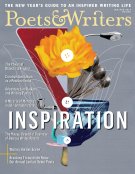This month Alberto Ríos will be sworn in as the first poet laureate of Arizona, the forty-third state in the nation to establish such a position. The author of eight books of poetry, including most recently The Dangerous Shirt (Copper Canyon Press, 2009), as well as three story collections and a memoir, Ríos has received such literary accolades as the Walt Whitman Award, for his debut collection, Whispering to Fool the Wind (Sheep Meadow Press, 1982), and a PEN/Beyond Margins Award. His collection The Smallest Muscle in the Human Body (Copper Canyon Press, 2002) was a finalist for the National Book Award. The son of a Mexican father and an English mother, Ríos grew up in the border town of Nogales, Arizona, and has been a professor at Arizona State University in Tempe for more than thirty years. His two-year term as poet laureate begins January 1.
 How did you find your way to writing?
How did you find your way to writing?
I was busted in the second grade for daydreaming. My parents were called to the school. I remember the ride home thinking I was in so much trouble—no dinner, no TV. But they gave me a great gift: They said nothing. It left me to figure out that those acts of imagination were mine. I got a scholarship to the University of Arizona. In the catalogue I found “English 9–Intro to Poetry–No Final,” and another, “Fiction Writing 9–No Final.” I signed up. I ended up in the English department, which is the last place I thought I would be. It felt like a big trick and I loved that it was on me. I keep waiting for that big final in both genres.
Magical realism, or lo real maravilloso, figures prominently in your poetry and fiction. Who were your influences?
Oddly, my first fiction teacher was the poet Peter Wild. I took a number of classes from him and in the second course he pulled me aside and told me something that changed my whole direction and my scholarly approach and in many ways my cultural approach. He said, “I just read a book that I think you might like. It’s called One Hundred Years of Solitude.” It changed my life.
In addition to giving public readings throughout the term, what are your plans as poet laureate?
I have probably been preparing for this [position] my whole professional life. I have one project that surrounds Tempe Town Lake: It’s basically a six-mile-long, two-and-a-half-ton, six-hundred-page book made of granite tiles. Four hundred tiles have words on them and the other two hundred have images. It’s called Words Over Water, and the form of writing on the tiles is called greguería: short, pithy one-liners combining high seriousness, humor, and epiphany. An example is, “Nobody owns water. Drink some and try to keep it.” Junior high kids love that one. I will continue creating poems of public purpose.
Arizona’s recent history has been a very political one, involving, among other things, immigration disputes and the banning of Latino literature from schools. What role does politics play in your work?
It’s quiet on the one hand because it’s a long-term shout. You can’t demand that someone do something for someone else, but [in your work] you can say, “Here’s why you might want to do something for someone else.” Sometimes you must lend yourself to that effort of speaking for others.
Your poem “Border Lines” will be featured on the wall at the Nogales port of entry early this year. What is your opinion of the border wall separating the United States and Mexico?
It was benign before. It was very porous. It was just a fence between neighbors. I think the border will come back and take care of itself. We have seen every wall fall around the world. That’s one of the oldest stories we tell and it’s always big, and why we don’t learn from that is stunning.
Norah Booth is a freelance journalist living in Tucson, Arizona.









Comments
kcrawford replied on Permalink
reading to students
Hi there! My name is Katie Crawford, I am a fourth grade teacher at Landmark School in Glendale. We are currently studying poetry (just ended our unit) and are beginning a unit on researching poets. It would be wonderful if I could get someone to come in my classroom! please comment back or email kcrawford@gesd40.org, thank you!!!
irisimage replied on Permalink
Imaginative Student!
Hello, I wonder because the same thing happened to me when I was in Elementary school. I was living in day dreaming all the time. Later on I became interested in Art and Writing. I worked as a painter and designer for about 20 years. Now I am doing new study to fulfill my love of writing (Poetry). Your 600 book project is amazing idea to work as a writer and create art work in the same time. Thank you for sharing.
Sawsan Elgamal